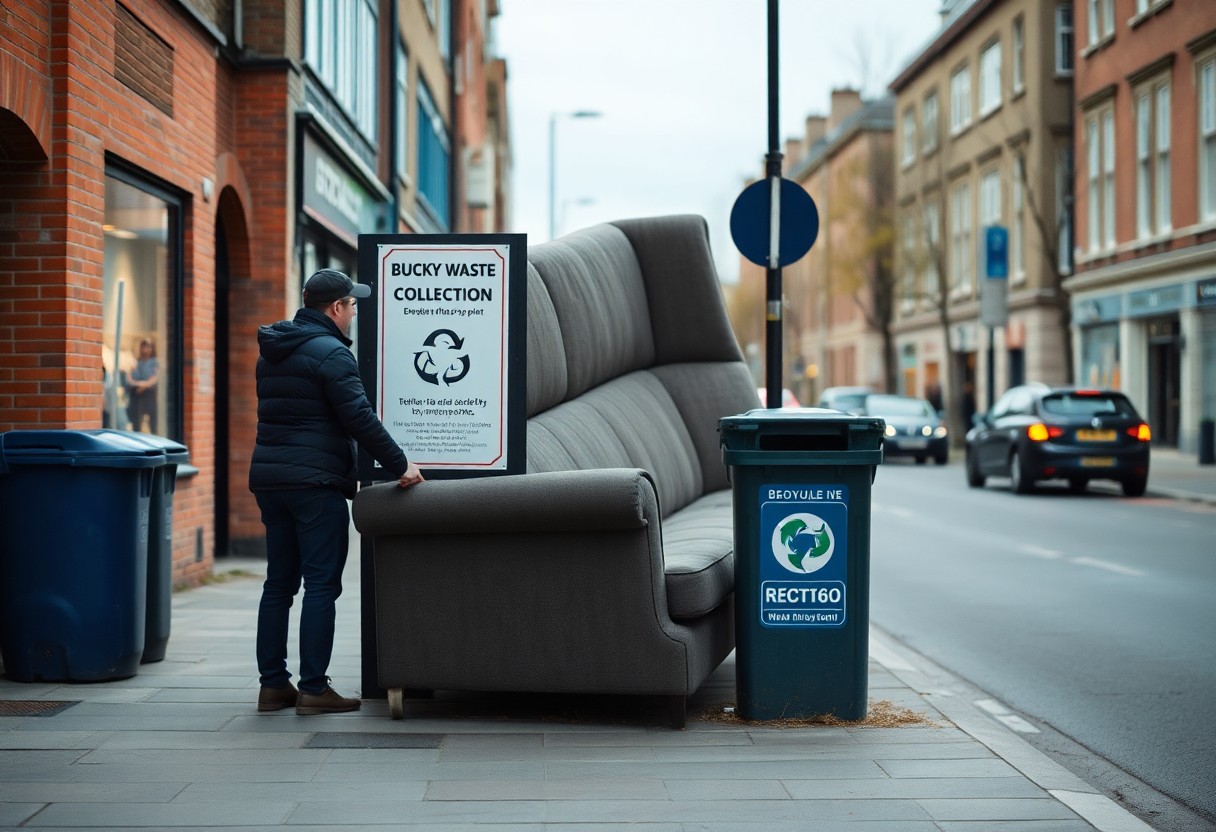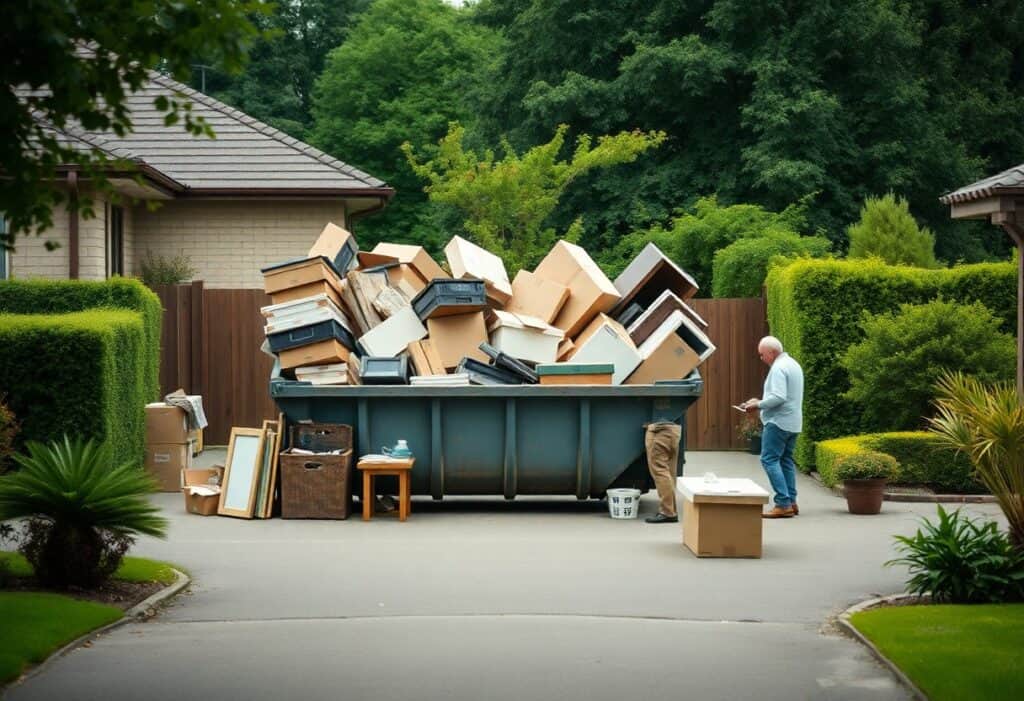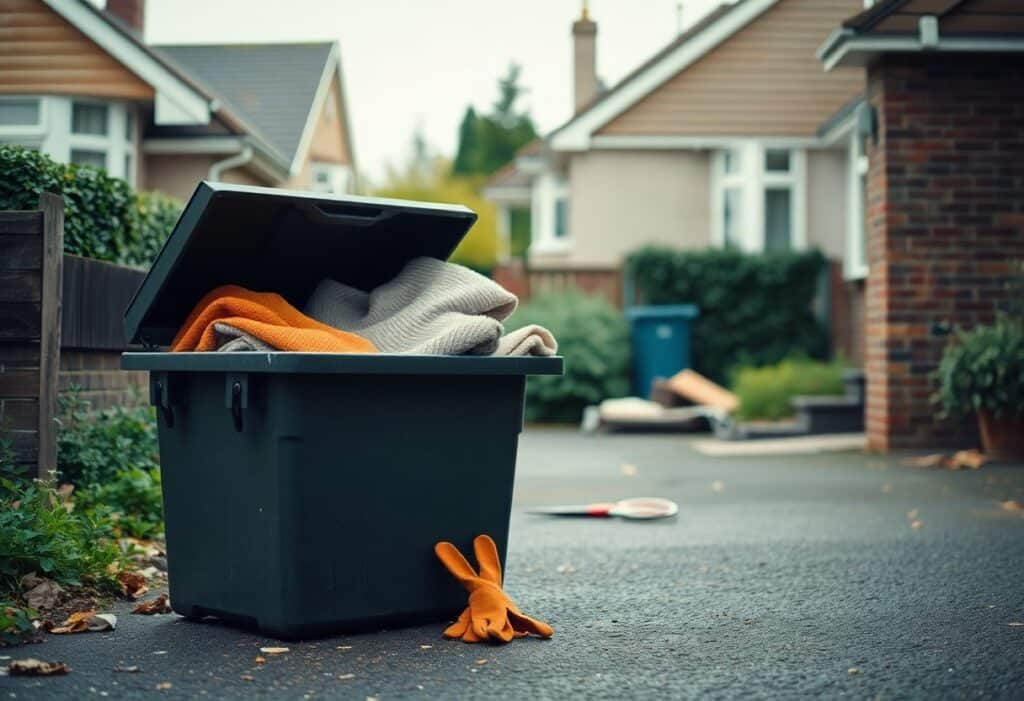There’s no need to stress about getting rid of those large unwanted items in your home. In London, you can ensure safe disposal by following the right steps. Improperly disposing of bulky waste can lead to environmental hazards and hefty fines. Instead, utilise local services that can help you efficiently clear your space. For a hassle-free option, you can request a collection of large household items (bulky waste) and do your part for the community and the environment.

Understanding Bulky Items
For those living in London, it is important to recognise what constitutes bulky items. Bulky items typically refer to large items that cannot be easily disposed of through regular waste collection services. To gain insight on How To Dispose of Rubbish in London, understanding this category is the first step towards responsible disposal.
Definition of Bulky Items
The term ‘bulky items’ encompasses larger goods that pose a challenge for standard refuse collection. These items typically exceed standard waste size limits and require special arrangements for disposal.
Common Examples
Now, some of the most common examples of bulky items include old furniture, mattresses, and white goods like fridges or washing machines.
This can include sofas, beds, and wardrobes, which can be cumbersome to handle. If these items are not disposed of properly, they can lead to environmental hazards such as fly-tipping. You should ensure that you dispose of such items through legitimate means, as this promotes a cleaner community and reduces waste-related issues.
Why Proper Disposal is Important
The importance of proper disposal of bulky items cannot be underestimated. By ensuring that you dispose of these items responsibly, you protect your local environment and contribute to a cleaner, safer community. Misplaced bulky waste can lead to unsightly litter and possible hazards, affecting both your well-being and that of your neighbours.
Environmental Impact
If you fail to dispose of bulky items properly, they can contribute to environmental degradation. Items left abandoned may end up in landfills, where they take years to decompose, releasing harmful chemicals into the soil and water. By practising responsible disposal, you can minimise your ecological footprint and promote a sustainable future.
Legal Requirements
While disposing of bulky items may seem straightforward, there are legal obligations you must adhere to. Not following local guidelines can result in fines, making it imperative to understand your responsibilities.
Plus, it’s important to note that failure to comply with good disposal practices can lead to unpleasant penalties, such as hefty fines or even legal action. Local authorities in London have well-defined regulations concerning waste management, which include specific methods for disposing of electronics, furniture, and other bulky items. Understanding these rules ensures you dispose of your items in a safe and legal manner, protecting not only yourself but also your community. Always check with your local council for the most up-to-date information on disposal requirements.
How to Prepare for Disposal
There’s a process to adequately prepare your bulky items for disposal. Begin by understanding the guidelines provided by your local council regarding what can be disposed of and the methods available. Ensuring that every item is assessed properly makes the disposal easier and more efficient, allowing you to take the right steps to make your efforts worthwhile.
Assessing Your Bulky Item
One of the first steps is evaluating the condition of your bulky item. Consider whether it is still functional or if it is beyond repair. Items that can be reused or refurbished may be better off donated rather than disposed of, as this supports sustainability.
Sorting and Decluttering Tips
Little time spent on sorting can yield great results. Begin with categorising your items to determine what can be recycled or donated. Use these tips for an efficient process:
- Identify functional items that can be reused.
- Check for dismantlable parts, which may be easier to dispose of.
- Organise items into donate, recycle, and dispose categories.
Thou should aim to create a tidy space by eliminating unnecessary items, making the disposal process much more manageable.
For instance, when sorting your items, consider the benefits of the reuse network. Some items could find a new lease of life, while others should be recycled responsibly. This not only clears your space but also contributes positively to the environment:
- Research local charities for donation opportunities.
- Utilise online platforms where you can sell or give away unwanted items.
- Participate in local community swaps or recycling events.
Thou may find that decluttering brings a refreshing sense of space and control to your environment.
Disposal Options in London
To dispose of bulky items in London, you have various options available that ensure a responsible and effective solution. These include services provided by local councils, charity donations, and private disposal services. By choosing the right option, you can help minimise waste and contribute positively to your community.
Local Council Services
Disposal through your local council is often the most reliable method for getting rid of bulky items. Many councils offer special collections for large items, enabling you to schedule a convenient pickup at little or no cost. Be sure to check your local council’s website for detailed information on availability and any associated fees.
Charity Donations
For those items that are still in good condition, consider donating to a charity. Many charities in London welcome bulky item donations and often offer collection services to simplify the process for you.
With numerous charitable organisations operating throughout London, you can find one that aligns with your values. Items such as furniture, appliances, and electronics can be given a second life, ultimately supporting those in need. Always ensure that the items are clean and usable, as this maximises the benefit to the charity and the community.
Private Disposal Services
Private disposal services provide an alternative for shedding those unwanted bulky items quickly and efficiently. Many firms specialise in collecting and disposing of large items, often offering same-day service.
Disposal through a private company can be a convenient option, especially when you lack the means to transport heavy or large items yourself. Just ensure the company you choose is committed to environmentally friendly practices, such as recycling and proper waste management, to avoid contributing to landfill issues.
Tips for Safe Disposal
After identifying the best method for disposing of your bulky items, consider these tips for safe disposal:
- Use a reputable collection service for large waste items.
- Check for any local regulations regarding waste disposal.
- Secure your items properly to prevent accidents during transport.
- Keep safety equipment, like gloves and masks, on hand.
This ensures a smooth and safe disposal process.
Safety Precautions
Safety is of utmost importance when disposing of bulky items. Always assess the weight and size of the items you plan to move. Use proper lifting techniques to avoid injury and consider using trolleys or dollies to transport your items. Clear the area of obstacles to minimise risk and consider wearing protective gear to enhance your safety.
Securing Additional Help
To ensure a safe disposal process, you may need to secure additional help. Whether it’s a friend, family member, or professional service, having someone assist you can make all the difference in managing bulky items.
Tips for enlisting help include informing your helper about the task at hand and discussing the plan beforehand. If the items are particularly large or heavy, consider hiring professionals who specialise in waste removal. They not only bring the right equipment, but they also possess the experience to tackle bulky items safely. This approach minimises the risk of injury and makes the process quicker and more efficient.

Factors to Consider
Now, before you proceed with the disposal of bulky items, consider the following factors:
- Type of item: Ensure it can be disposed of legally.
- Your location: Check local regulations and services.
- Collection methods: Research options available for bulky item disposal.
- Environmental impact: Aim for sustainable methods.
Assume that you want a hassle-free experience; you can Book a bulky item collection to assist you.
Timing and Scheduling
Even with a busy schedule, planning your bulky item disposal is imperative. Verify the collection days in your area and choose a time that suits you best, ensuring the items are ready for collection when scheduled.
Costs Involved
Clearly, there may be costs associated with disposing of bulky items. Different local councils may charge varying fees, so it’s advisable to check.
Involved assessments of costs can vary significantly based on the type of service you choose. For instance, local councils might offer free collections for certain items, while private services may charge up to £100 or more. Be aware of potential additional fees for hazardous materials—these can increase your total expenditure considerably. Evaluating all your options allows you to make informed financial decisions.
To wrap up
As a reminder, when it comes to safely disposing of bulky items in London, you should utilise your local council’s collection services, charity shops, or designated recycling centres. Always check for guidelines specific to your area, as these may vary. By taking these steps, you can ensure that your unwanted items are disposed of responsibly without causing inconvenience to others or harming the environment.
FAQ
Q: What are the proper methods for disposing of bulky items in London?
A: In London, residents can dispose of bulky items through several methods. The most common way is to schedule a collection with the local council, which often offers a bulky waste collection service for free or for a nominal fee. Additionally, you may consider donating reusable items to charities, taking them to a local recycling centre, or using a private waste disposal service. Always check your local council’s website for specific guidelines and scheduling.
Q: Are there any charges associated with bulky item disposal?
A: While many London boroughs offer a free bulky waste collection service, some may charge a fee depending on the number of items being collected or the type of items. It is advisable to check with your local council for the exact charges and conditions associated with their bulky waste collection services.
Q: Can I leave bulky items on the street for collection?
A: It is generally not permitted to leave bulky items on the street without prior arrangement with your local council. Doing so may lead to fines or penalties. Always contact your local council to schedule a bulky waste collection or to confirm the appropriate disposal method.
Q: What items are considered bulky waste?
A: Bulky waste typically includes large household items that cannot be easily disposed of in regular waste bins. This usually encompasses furniture (like sofas and mattresses), appliances (such as fridges and washing machines), and large garden waste. Check with your local council for a comprehensive list of items they consider as bulky waste, as this may vary by borough.
Q: How can I find recycling centres that accept bulky items?
A: To find recycling centres in London that accept bulky items, you can visit your local council’s website, which often provides details of nearby recycling facilities. Additionally, websites such as the London Waste and Recycling Board offer information about recycling centres, including what items they accept and their operating hours. You may also call the centres directly for any specific inquiries about bulky waste disposal.



